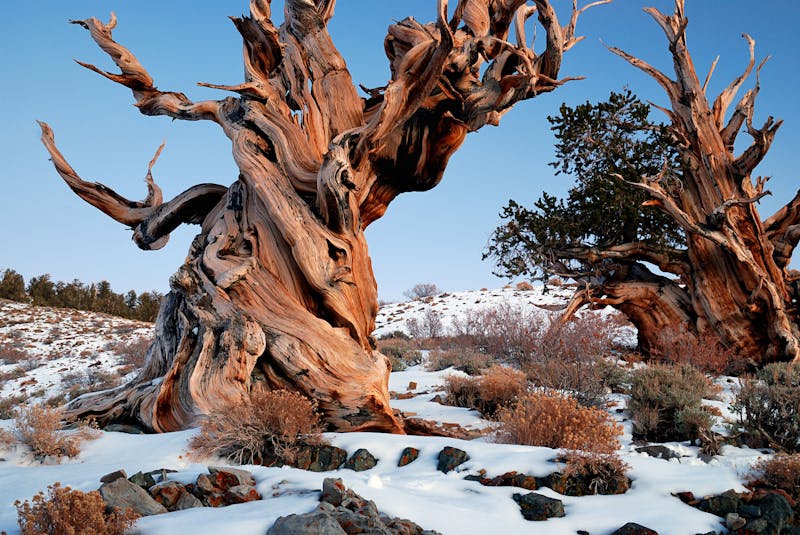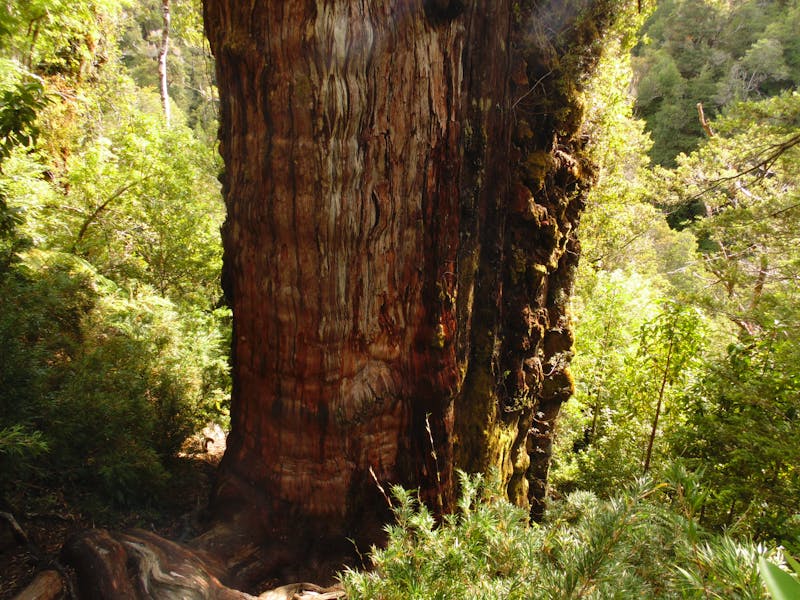This post was updated on May 12, 2023.
In eastern California, a Great Basin bristlecone pine (Pinus longaeva) known as Methuselah has long been considered Earth’s oldest living thing. According to tree-ring data, Methuselah is 4,853 years old — meaning it was well established by the time ancient Egyptians built the pyramids at Giza.
And while Methuselah’s precise location is kept under wraps to protect it from harm, there’s much we do know about this living relic.
A grove of bristlecone pines in California's White Mountains.
Pinus longaeva grow at the uppermost edge of the timberline, among the windswept peaks of California, Nevada and Utah. The trees’ ability to thrive in this unforgiving landscape of freezing temperatures, arid soils and relentless winds is the key to their remarkable longevity. They draw sustenance from the most brittle layers of limestone and carbonate rock — what passes for fertile soil at high elevations. And their gnarled, twisted branches, which are shaped by fast-moving currents of mountain air, provide stability and reduce the risk of breakage during storms. Uniquely, the trees’ roots provide nourishment only to the specific section of branches directly above it. This ensures that if a root dies off due to exposure, only the corresponding segment of the tree is affected, allowing the rest to continue growing.
- FURTHER READING: Study: How years of wildfires have devastated the Amazon
Recently a challenger emerged to vie for Methuselah’s longevity record, National Geographic reported. In Chile, a Patagonian cypress (Fitzroya cupressoides) known as the Alerce Milenario or Gran Abuelo (great grandfather in Spanish) could be 500 years older than reigning champion Methuselah.
Dating of the Alerce Milenario was accomplished not via the traditional method of “coring” the tree — driving a thin, hollow screw through the middle of the tree to extract a core where each ring can be tallied — but using a partial ring count coupled with statistical computer modeling to make up the difference. The approach — while less risky for the tree — has left some experts unconvinced.
Alerce Milenario in Chile.
But no matter their precise ages, these time-worn trees can tell us much about our changing climate. Each tree ring holds climate data from the year it grew, allowing researchers to create accurate climate models going back thousands of years — including evidence of temperature fluctuations, precipitation variability and even large volcanic eruptions. And as ancient trees like Methuselah grow at high elevations, they can be susceptible to small fluctuations in temperature, making them faithful chroniclers of the world’s weather patterns.
In fact, trees not only provide clues about past climate, they play a critical role in combating climate change today. Forests help stabilize global temperatures by trapping planet-warming carbon in their roots and soil. A recent Conservation International study revealed that the Amazon rainforest stores more irrecoverable carbon — that is, carbon that could not be restored within our lifetimes if emitted — than any other region on Earth.
Whichever contender — Methuselah or Alerce Milenario — ultimately takes the title, one thing is clear: Nature is resilient and adaptable when properly stewarded. We would do well to keep all trees, from ancient to nascent, healthy and protected.
Further Reading
Vanessa Bauza is the editorial director at Conservation International. Want to read more stories like this? Sign up for email updates. Also, please consider supporting our critical work.

